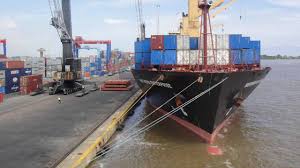In response to the strengthening of the naira in the official foreign exchange window, the Central Bank of Nigeria (CBN) has announced a significant cut in the exchange rate used for computing Customs duties at the nation’s seaports. The adjustment, amounting to 7.3%, is expected to provide relief to importers, allowing them to save about N116.924 per dollar.
The Customs duty rate has been revised downward from N1,605.82/$ to N1,488.896/$, as indicated by information on the official trade portal of the Nigeria Customs Service. This marks the second adjustment in 2024, following the downward trend, providing a notable reduction in the cost of Customs duties for importers.
Emenike Nwokeoji, the national president of the Association of Nigeria Licensed Customs Agents (ANLCA), urged the CBN to consider setting a stable exchange rate for paying Customs duties for a six-month period. Nwokeoji emphasized that the fluctuating rates hinder businesses from effective planning, causing frustration for companies relying on bank financing.
Industry expert and licensed Customs agent, Taiwo Mustapha, expressed concerns about the impact of exchange rate fluctuations on the port industry, especially in the context of Customs duty payments. Mustapha highlighted the adverse effects on Customs licensed agents and importers, leading to a drastic reduction in cargo volume at the ports. The current situation has forced many businesses to scale back operations, with staff idling in offices and salaries being paid despite a lack of jobs.
“If we continue like that, most of us will go out of business. Our staff are sitting idle at the offices and we are paying salaries because there is no job to be done. Take a look at the auto dealers on some of the streets, the number of vehicles on their stand has reduced dramatically,” Mustapha expressed, underscoring the critical need for stability in the exchange rate to support the recovery and growth of the import-dependent sectors.
The CBN’s move to slash the Customs duty exchange rate aligns with efforts to adapt to the changing economic landscape, offering a glimmer of hope for importers grappling with uncertainties and financial challenges. The call for a more stable and predictable exchange rate is echoed by industry stakeholders who anticipate a positive impact on businesses and the overall economic environment.















